
The phrase “ripped from today’s headlines” has rarely been more applicable than it is to Theresa Rebeck’s gripping, provocative new drama Zealot, a South Coast Repertory World Premiere sure to inspire post-performance discussion as highly-charged as the action unfolding at the temporary headquarters of the British Consul in Mecca, Saudi Arabia, where Zealot is set.
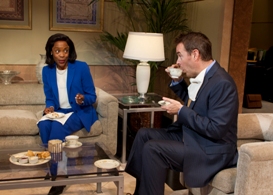 It is there that British Consul Edgar Featherstone (Alan Smyth) and American Under-Secretary Of State Ann Haddad (Charlayne Woodard) “meet cute,” Edgar discovering her unannounced—and undesired—in his plush, Arabesque office … though any further cuteness ends once the two diplomats have gotten down to business.
It is there that British Consul Edgar Featherstone (Alan Smyth) and American Under-Secretary Of State Ann Haddad (Charlayne Woodard) “meet cute,” Edgar discovering her unannounced—and undesired—in his plush, Arabesque office … though any further cuteness ends once the two diplomats have gotten down to business.
Having arrived with virtually no advance notice on the day of the opening ceremonies of the annual worldwide Muslim pilgrimage known as “The Hajj,” Ann explains her unexpected presence in Mecca as the result of “Internet chatter” suggesting that “something is being planned, something extensive,” and more specifically that “the women [are] going to do something.”
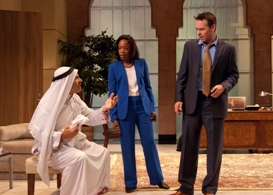 As to what that “something” might be, any question Edgar or Ann might have is answered by the sudden arrival of Saudi diplomat Usama (Demosthenes Chrysan), his white robe bloodied from what appears to have been a massacre at the most sacred of Muslim shrines, the Ka’aba.
As to what that “something” might be, any question Edgar or Ann might have is answered by the sudden arrival of Saudi diplomat Usama (Demosthenes Chrysan), his white robe bloodied from what appears to have been a massacre at the most sacred of Muslim shrines, the Ka’aba.
According to Usama, a group of women from Islamic countries as diverse as Turkey, Iran, and Egypt have just defied Sharia law by daring to remove their headscarves during prayer, an action provoking outrage, “fury [that] could not be contained,” and as we will soon learn, perpetrators being torn limb from limb.
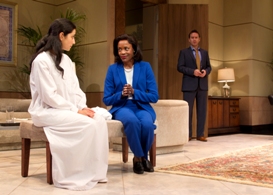 Matters get even more complicated by the sudden arrival of Marina (Nikki Massoud), a veiled, white-robed young woman who has come with an explanation … and a request.
Matters get even more complicated by the sudden arrival of Marina (Nikki Massoud), a veiled, white-robed young woman who has come with an explanation … and a request.
The Iranian woman’s explanation for what so enraged her fellow worshipers is a simple one: “We wanted to bow our heads to Allah and say, ‘Behold your creation.’ We wanted to be beheld.” As for her request, it is a simple one too, that the United States grant her asylum.
Not surprisingly, this request provokes strikingly different reactions from each of the three diplomats, Usama insisting that the British let the Saudis arrest her without delay, Edgar outraged that the mere presence in the British consulate of this “terrorist” could escalate into an international incident, and Ann surreptitiously emailing her superiors for permission to grant Marina’s request.
And from this point on all bets are off.
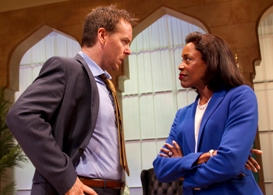 Like David Mamet’s recent white playwright’s take on Race in his play of the same name, popular scribe Rebeck is likely to undergo flak for taking on issues involving a religion not her own. (I can’t help wondering how Saudis in particular will react to Zealot as word of it reaches them through the Internet grapevine.)
Like David Mamet’s recent white playwright’s take on Race in his play of the same name, popular scribe Rebeck is likely to undergo flak for taking on issues involving a religion not her own. (I can’t help wondering how Saudis in particular will react to Zealot as word of it reaches them through the Internet grapevine.)
Still, like Mamet before her (and Marina as described by Edgar), Rebeck is a provocateur, and our theatrical world is richer for her daring, if only because if someone doesn’t go there, who will?
Hardly anything is “hands off” in Zealot, the prolific playwright forcing us to look at ourselves, our country, and the world we live in … and to ask questions.
Zealot zeroes in on Western attitudes towards the Islamic world, with Edgar remarking that “we have too often leapt with arrogance to an understanding that is no understanding at all,” while Usama, referring to those who became only minutes earlier became “animals before the eyes of Allah,” proclaims that although “people want to believe this of us, of the Muslim people …, it is untrue. We are a civilized people. We are civilized.”
And while Ann declares herself proudly Muslim, Edgar is quick to remind her that as an American follower of Islam, she does not share the Saudis’ “belief system, their tribalism, their rage, their humility, their hospitality, their pride …”
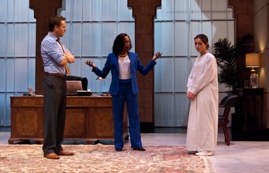 Other topics brought up by Rebeck and her characters include women’s roles in Islamic countries and the roles played by women in a world still ruled by men, how much we can ever believe of “the official story” as reported by the press, and questions of possible American complicity in international incidents like the one at the heart of Zealot.
Other topics brought up by Rebeck and her characters include women’s roles in Islamic countries and the roles played by women in a world still ruled by men, how much we can ever believe of “the official story” as reported by the press, and questions of possible American complicity in international incidents like the one at the heart of Zealot.
Edgar takes pains to point out to feminist Ann that “any representative of a foreign government who might dream of telling the Saudis how they can or cannot treat their women would in fact be considered ‘racist’,” and he poses a fascinating what-if question about Nelson Mandela circa 1962 that hits upon the question of doing “right” when, as Edgar puts it, it would “cost [a country] dearly” not to take the more politically expedient path. (Edgar’s last question acquires added meaning in Zealot’s twists-and-turns-filled second act.)
Zealot poses questions about the difference between “legal authority” (which Edgar claims in refusing to hand Marina over to the Americans) and “moral authority” (which Ann insists trumps his), and raises the age-old question: Are those who claim to have been spoken to directly by God prophets or crackpots? (Marina has no doubt which one she is, though Edgar, Ann, and Usama would doubtless beg to differ.)
And lest you think that Rebeck’s writing is without its lighter moments, there’s Edgar’s remark about that “new craze in America, no wheat. Or butter or flour or frankly anything one might actually want to eat for breakfast,” or his wondering aloud how long it will take Homeland Security “to start sending out … watermelon alerts to let us know that … we might expect an extra helping of sherbet at lunch,” or his rather spot-on quip that “The Internet is obsessed with cats playing the piano.”
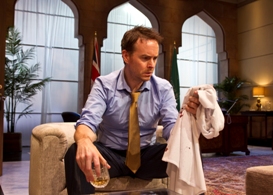 As the above remarks might suggest, Edgar turns out to be the wittiest of Zealot’s cast of characters, in addition to being its most volatile and colorful, and Smyth runs with everything Rebeck gives him in the production’s most exciting, watchable performance under Marc Masterson’s more-than-able direction.
As the above remarks might suggest, Edgar turns out to be the wittiest of Zealot’s cast of characters, in addition to being its most volatile and colorful, and Smyth runs with everything Rebeck gives him in the production’s most exciting, watchable performance under Marc Masterson’s more-than-able direction.
Woodard’s sophisticated, nuanced Ann is very good work from an actress whose greatest fame has come from a quartet of one-woman shows and who must be relishing the chance Zealot offers her to play off other actors.
Massoud is absolutely believable as a young Iranian woman whose “zealotry” she views as simply doing “what God has asked of me, what he asks of all of us,” and the Maryland native’s Farsi accent when speaking English is spot-on.
Chrysan is a commanding presence in the play’s least nuanced role, though Usama is far from unbelievable to anyone familiar with Saudis for whom strict adherence to Islamic law is paramount.
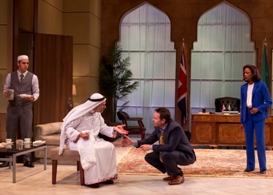 Recent Cal State Fullerton MFA grad Adam El-Sharkawi makes the most of his brief moments as consulate employee Yousef, and his British accent (suggesting an education abroad not mentioned in Rebeck’s script) is a nice touch.
Recent Cal State Fullerton MFA grad Adam El-Sharkawi makes the most of his brief moments as consulate employee Yousef, and his British accent (suggesting an education abroad not mentioned in Rebeck’s script) is a nice touch.
Scenic designer Ralph Funicello’s gorgeous, expansive set, Russell H. Champa’s vivid, drama-enhancing lighting, Cricket S. Meyer’s electric sound design, and Alex Jaeger’s character-perfect costumes are every bit as world class as South Coast Repertory regulars have come to expect.
Kelly L. Miller is dramaturg, Joshua Marchesi production manager, and Sue Karutz is stage manager. Casting is by Joanne DeNaut, CSA. Kathryn Davies is assistant stage manager and Travis Donnelly assistant director. Dina Eletreby gets high marks as Arabic dialect coach.
Ultimately, though many of the questions posed in Zealot are left unanswered, it would appear to be Theresa Rebeck’s intention to let them remain so … and to leave it up to us to ponder, to debate, and to come to our own conclusions.
Edge-of-your-seat entertainment, Zealot is theater at its most provocative and thought-provoking.
South Coast Repertory, 655 Town Center Drive, Costa Mesa.
www.scr.org
–Steven Stanley
October 28, 2014
Photos: Debora Robinson, Ben Horak/SCR
Tags: Orange County Theater Review, South Coast Repertory, Theresa Rebeck



 Since 2007, Steven Stanley's StageSceneLA.com has spotlighted the best in Southern California theater via reviews, interviews, and its annual StageSceneLA Scenies.
Since 2007, Steven Stanley's StageSceneLA.com has spotlighted the best in Southern California theater via reviews, interviews, and its annual StageSceneLA Scenies.







 COPYRIGHT 2025 STEVEN STANLEY :: DESIGN BY
COPYRIGHT 2025 STEVEN STANLEY :: DESIGN BY